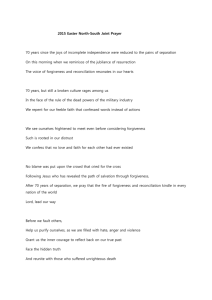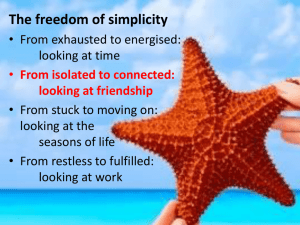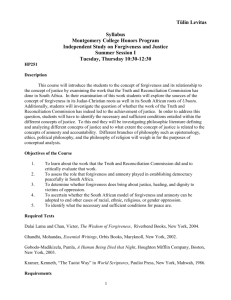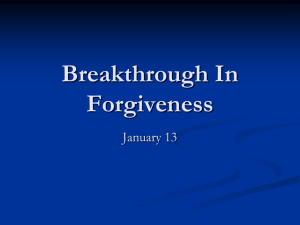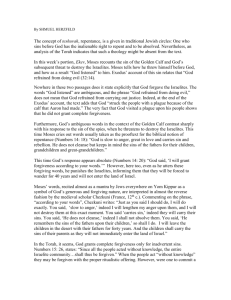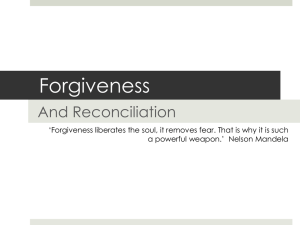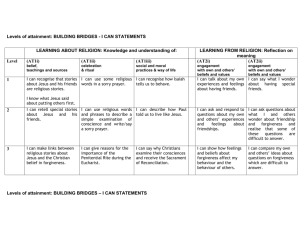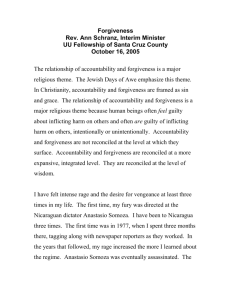Peacemakers - David Downs
advertisement
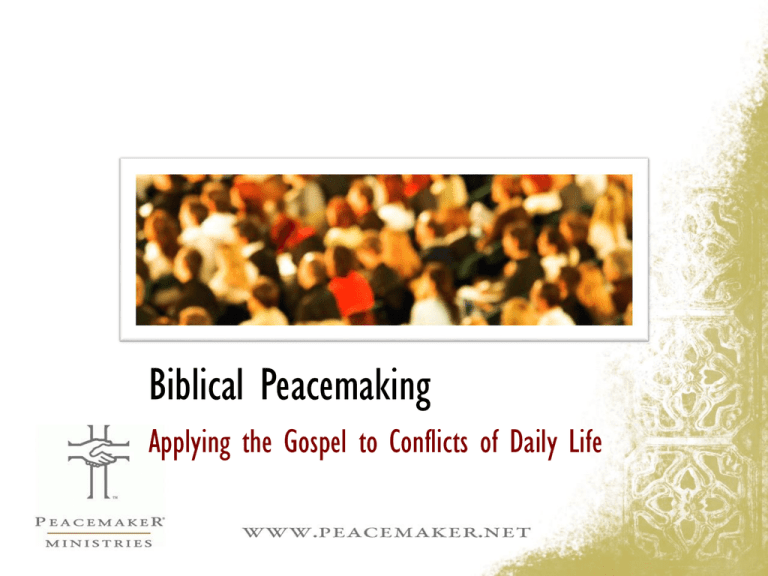
Biblical Peacemaking Applying the Gospel to Conflicts of Daily Life An Introduction to Biblical Peacemaking Putting It Into Practice The Slippery Slope The Four Gs: A God-Centered Response to Conflict Glorify God-- How can I please and honor God in this situation? Get the log out of your eye--How can I show Jesus’ work in me by taking responsibility for my contribution to this conflict? Gently restore-- How can I lovingly serve others by helping them take responsibility for their contribution to this conflict? Go and be reconciled--How can I demonstrate the forgiveness of God and encourage a reasonable solution to this conflict? A Different Harvest The Blessing of Building a Culture of Peace ‘”Peacemakers who sow in peace raise a harvest of righteousness.” James 3:18 The First G Glorify God How can I please and honor God in this situation? “Whatever you do, do it all for the glory of God.” --1 Corinthians 10:31 You can glorify God in the midst of conflict by • trusting Him • obeying Him • imitating Him Bring Glory to God by Being a Peacemaker How do people typically respond to conflict? •Escape Responses •Attack Responses •Peacemaking Responses One Great Way to Glorify God Ask Yourself, “Is This Worth Fighting Over?” “A man's wisdom gives him patience; it is to his glory to overlook an offense.” Proverbs 19:11 Pause for Thought Which response on the Slippery Slope was used most by your parents when growing up? Where do you tend to slide off? How do you flip between Escape and Attack? The Second G Get the Log Out of Your Eye How can I show Jesus’ work in me by taking responsibility for my contribution to the conflict? Getting to the Heart of Conflict Idol Progression: Something you want too much, you will sin to obtain (or sin if it’s denied) Some idol-revealing (“X-Ray”) questions: • How would you respond to disappointment or barriers related to this area? • Have you ever ‘stretched’ the truth in arguing for or against your desire? • How are your opponents being treated in this area? The cure for an idolatrous heart: • Confess your sin and trust in God alone for everything you need (Acts 3:19). • Replace idol worship with worship of the true God (Ps. 37:4). Pause for Thought--How to Spot a Heart Idol: • Self-examination • Prayer • Scripture • Godly counsel Make A Good Confession (Seven A Words) • • • • • • • Address everyone involved Avoid “if,” “but,” and “maybe” Admit specifically Acknowledge the hurt Accept the consequences Alter your behavior Ask for forgiveness (allow time) The Third G Gently Restore How can I lovingly serve others by helping them take responsibility for their contribution to this conflict? Restore Gently—Speak the Truth in Love “Brothers, if someone is caught in a sin, you who are spiritual should restore him gently. But watch yourself, or you also may be tempted. Carry each other's burdens, and in this way you will fulfill the law of Christ. If anyone thinks he is something when he is nothing, he deceives himself.” Galatians 6:1-3 The Governing Dynamic is Love: • Step One: Talk privately to resolve personal issues • Step Two: Take two or three others along • Step Three: Tell it to the church • Step Four: Treat the other person as a non-believer • Step Five: Forgive and restore the repentant A helpful approach to difficult conversations “Do nothing out of selfish ambition or vain conceit, but in humility consider others better than yourselves. Each of you should look not only to your own interests, but also to the interests of others. Your attitude should be the same as that of Christ Jesus::” Phil. 2:3-5 The PAUSE Principle: • Prepare: Pray, seek godly counsel, study scripture, develop options, plan your remarks • Affirm Relationships: The people and the problem • Understand Interests: The underlying motivations for positions • Search for Creative Solutions: Don’t get stuck • Evaluate Options Objectively and Reasonably The Fourth G Go and Be Reconciled How can I demonstrate the forgiveness of God and encourage a reasonable solution to this conflict? Forgiveness “Be kind and compassionate to one another, forgiving each other, just as in Christ God forgave you.” Eph. 4:32 What forgiveness is not: Forgiveness is neither a feeling nor forgetting, nor is it excusing. What forgiveness is: Forgiveness is a decision modeled after God’s forgiveness of us. Four Promises of Forgiveness • • • • I will not dwell on this incident I will not bring this incident up and use it against you I will not talk to others about this incident I will not allow this incident to stand between us or hinder our personal relationship
